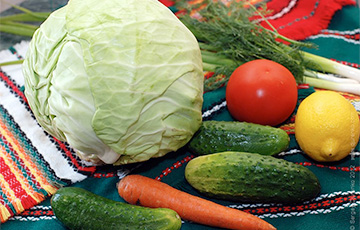Counter-Sanctions Left Belarus Without Vegetables
28- 7.02.2022, 20:05
- 27,162

Minsk has banned the export of onions and cabbage from the country.
Belarus considers itself an agricultural country, the authorities say the country can fully provide itself with food. The government attributes the deficit on the market and the export ban on some foodstuffs to external factors. Statistics suggests that counter-sanctions might have caused the deficit, reports Nezavisimaya Gazeta.
The Belarusian government has banned the export of onions, cabbage and apples. These products can be exported only under single licenses issued by the Ministry of Antimonopoly Regulation and Trade (MART). This decision will be valid for three months.
Minister of Anti-Monopoly Regulation and Trade Aliaksei Bahdanau has admitted that this decision is related to the shortage of products on the market. The decision was made to "avoid uncontrolled export from our country in order to ensure saturation of the domestic market". According to him, the prices of these products have gone up and there is a great temptation to sell them abroad and make money without worrying that there will not be enough cabbage, onions and apples for the domestic population.
A few days earlier Prime Minister Raman Halouchanka had denied any shortage of vegetables. Cabbage, onions and apples became "problematic" in early January, when statistics on the year's results were released. It turned out that these types of food products are leaders in price growth. The maximum growth was seen at the end of the year - in November and December. For example, the price of white cabbage tripled over the year, and in November it went up by almost 25%.
In order to stop the price rise, the government found nothing better than to prohibit administratively the price increase (for Belarusian-made goods). A separate document specified how much cabbage, onions and carrots should cost. Then they disappeared from sales entirely, and the cost of imported ones increased several times. Thus, according to the laws of the market, if a commodity is in short supply, it becomes more expensive.
Meanwhile the statistics gives the grounds to speak about two reasons which could lead to deficit of the simplest and the most demanded kinds of goods.
Firstly, this year they were produced by 2.4% less than last year (1.7 million tons). By the way, Belarus also decreased the production of other foodstuffs: livestock and poultry in live weight - by 3% (1.8 million tons), grain and leguminous plants - by 15% (7.4 million tons), potatoes - by 8% (4.8 million tons). The Eurasian Development Bank experts noted in their report that the decline in agricultural production (by 4.2% for the year) slows down the economy of Belarus as a whole. The authorities, in their turn, see the reasons for the decrease in agricultural production in bad weather, while experts point to the inefficiency of the industry and illiterate agrarian policy.
The second reason which led to the deficit of some foodstuffs is also a consequence of the actions of the government itself. We remind that at the beginning of December, the Belarusian authorities, in response to the sanctions, introduced their own counter-sanctions and banned imports of a number of imported products from "unfriendly" countries. Vegetables and fruit were also among them. Even then, commenting on the possible consequences of this decision, the importing companies warned that cabbage and apples might be in short supply and then become more expensive, as quite a lot of them were imported from Poland.
The Belstat data shows that this prediction started to come true even before the counter-sanctions took effect (on January 1). For example, in 2020, Belarus bought almost 4 thousand tons of cabbage from Poland, worth $2.6 million. Poland was its largest supplier. Data for 2021 shows that Belarus bought half as much cabbage - 2 thousand tons, worth $1.2 million. Now Ukraine is its biggest supplier. On January 1, deliveries from Poland were supposed to stop.
The situation is even worse with apples, because almost all of them were imported from Poland - 93% by the results of January-November 2021. 48% of onion supplies in 2021 were coming from the "unfriendly country" - the Netherlands. Starting from January 1, they also had to be stopped.
We remind that the government decree does not exactly prohibit deliveries of subsanctioned products. The document stipulates that a special permit must be obtained for their import into the country. It is possible that the authorities will still have to import deficit products from "unfriendly" countries.










